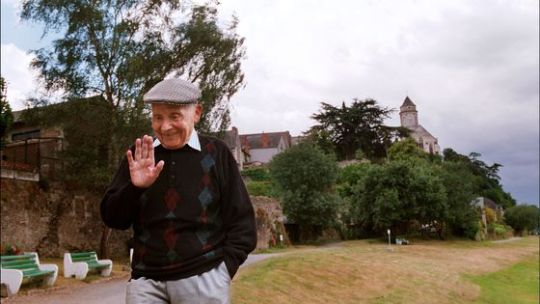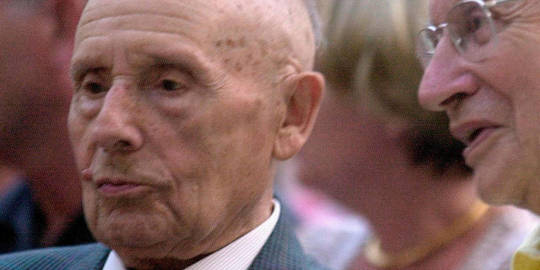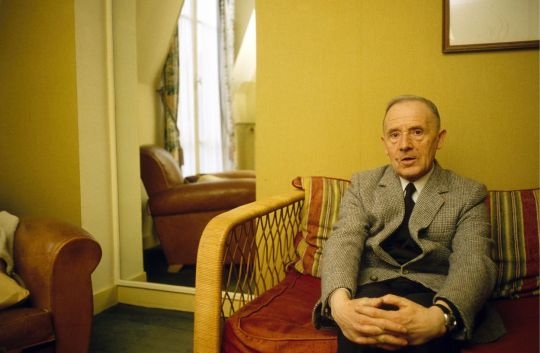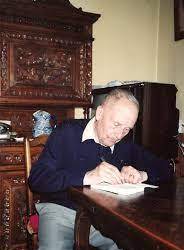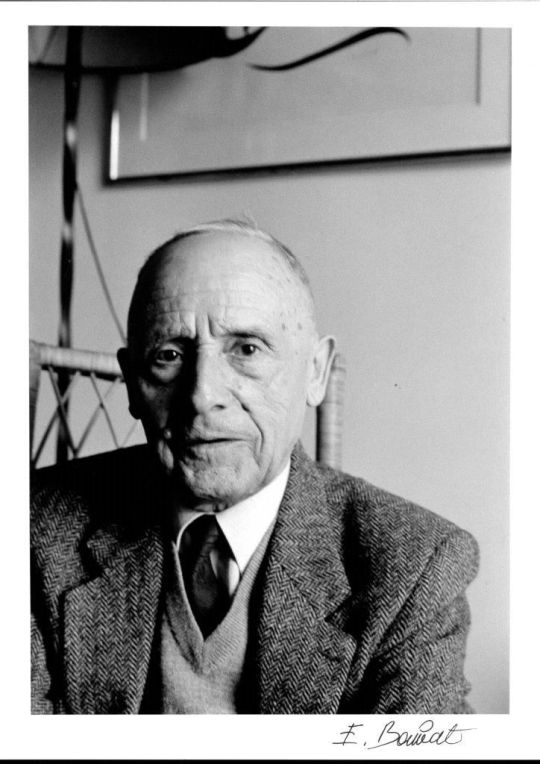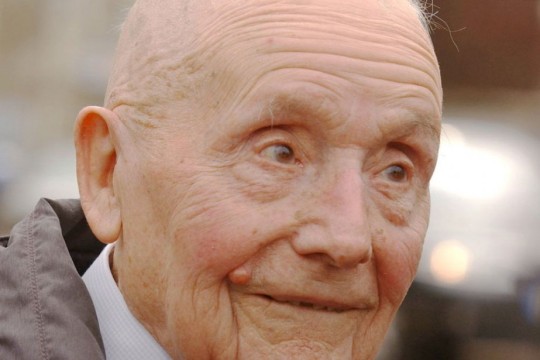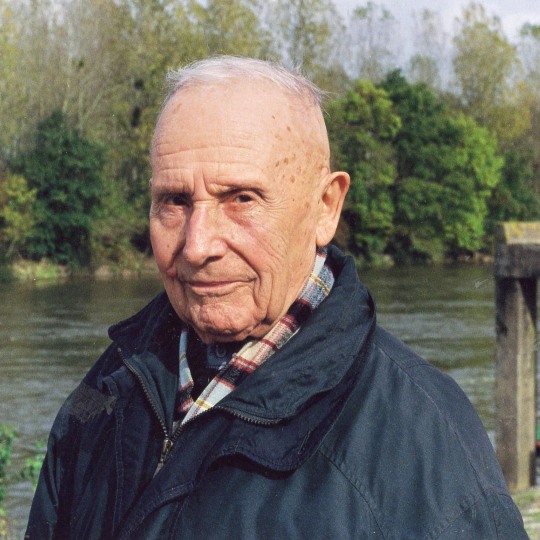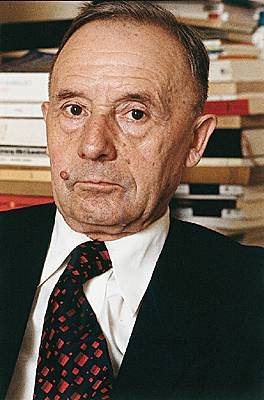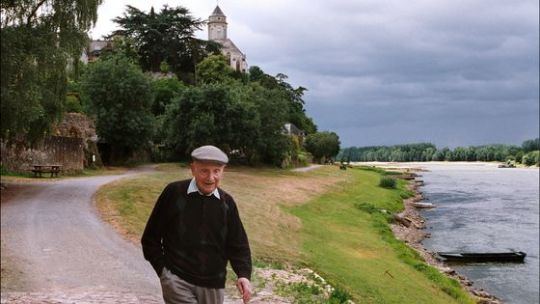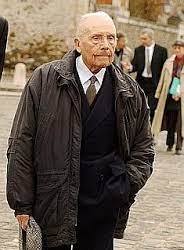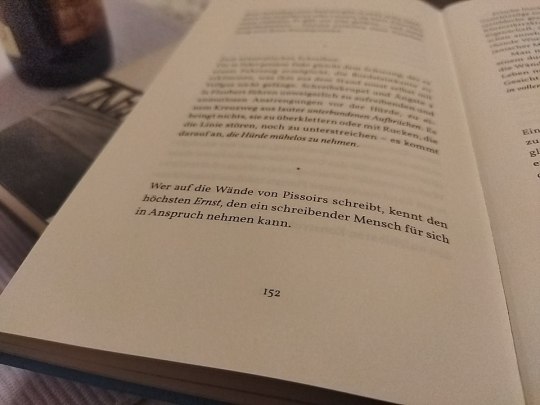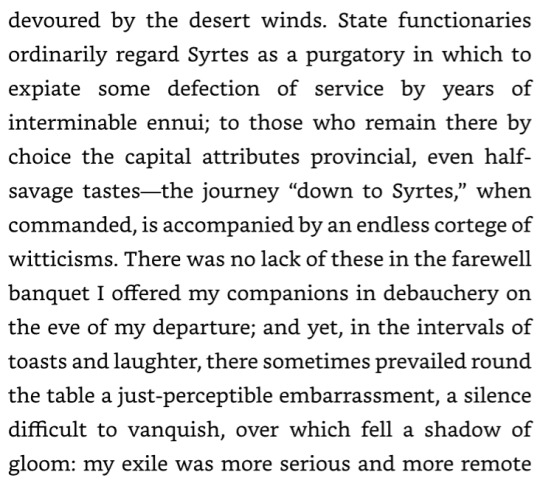#Julien Gracq
Text
Tant de mains pour transformer ce monde, et si peu de regards pour le contempler.
— Julien Gracq, Lettrines
32 notes
·
View notes
Text
March 2023
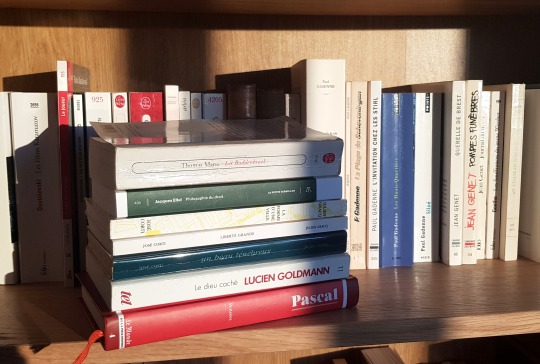
Un beau ténébreux, Julien Gracq, 1945 | How come each Gracq’s book I read becomes my favorite? Well, Le roi pêcheur is still my absolute favorite but this one comes right after. The atmosphere, the tension, everthing is addicting. The writing, so elegant and striking. I really love Julien Gracq you guys.
Philosophie du droit, Jacques Ellul, 2022 | This is a lecture from the 70s given by Ellul to PhD students in Bordeaux. Kinda sad to see that PhD students from that same university are now mainly offered lectures on entrepreneurship and how not to be too depressed during their thesis! About the book itself, just like a lecture, some bits are really interesting and others less. Not too dense, overall a good introduction to law philosophy I think!
Pensées, Blaise Pascal, 1669 | I read this in order to read another book about jansenism and the figure of God in Pascal’s, Racine’s and Kant’s work. I’ll admit I skipped the parts about theology but the first half of the book is really worth reading. Not gonna lie, I wouldn’t have enjoy reading this if not for Goldmann’s book that brings a really interesting light on Pascal’s philosophy!
Le Dieu caché, Lucien Goldmann, 1955 | This book is an analysis of Pascal’s Pensées (and Racine’s tragedies but this is a very short part of the book unfortunately). I really like how it uses concepts and methods from Hegel and Marx to give a really deep and interesting insight on Pascal’s philosophy. The main concept of the book is the concept of “vision du monde” (world view). The author tries to demonstrate that Pascal’s philosophy (and Racine’s tragedies) embodies a tragic world view. The author shows that Pascal’s philosophy is one of paradoxes that cannot be solve in the world, but only in christian heaven. Thus, a never ending suffering for the one that cannot not live in the world where everything is relative and full of contradictions yet aspires to something absolute that can embrace and overtake the contradictions.
Liberté grande, Julien Gracq, 1946 | I was a bit disappointed but not too surprising as I am not usually a fan of prose poetry! Well, I had to have a least favorite Gracq’s piece!
Buddenbrooks, Thomas Mann, 1901 | Second book by Mann that I read and he is slowly but surely becoming an author that I really enjoy. This one is the portrayal of an old and wealthy family declining in a generation or so. The writing is clever, witty, often funny, often touching. Reading it was a ride! It had been a while since I appreciated a book so much for its characters.
La forme d’une ville, Julien Gracq, 1985 | An essay about the French city of Nantes and its role in shaping what is a city for the author. Very poetic essay (very Gracq), as the title suggests : as Baudelaire wrote, “la forme d'une ville change plus vite, hélas ! que le cœur d'un mortel”. It isn’t a description of Nantes as it is (was) but rather an exploration of the city as it exists in Gracq’s memory and mind.
#do reads#do read list#book#books#book review#bookblr#book rec#book recommendations#book reviews#reading#reading journal#reading recap#read in 2023#books of 2023#julien gracq#thomas mann#lucien goldmann#blaise pascal#pascal#jacques ellul
18 notes
·
View notes
Text

New Directions cover of Julien Gracq's "A Dark Stranger" (1951) by Gertrude Huston
31 notes
·
View notes
Text
Finally found a copy of Julien Gracq's Chateau D'Argol, his excellent but out-of-print first novel that reads like a Goth-ified, Surrealist Wagner opera. It's an example of how potent and hypnotic purple prose can be when it's done right (i.e. not like Lovecraft).
7 notes
·
View notes
Photo

livre 15
9 notes
·
View notes
Text
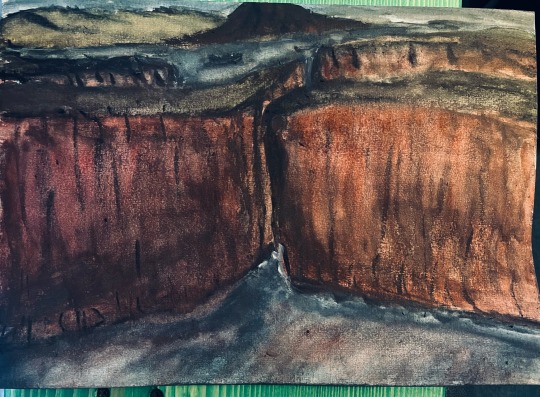


Resimleme denemesi 👩🎨📚🖌️
Sirte Kıyısı - Julien Gracq
Tatar Çölü - Dino Buzzati
Dağların Adamı Barnabo - Dino Buzzati
9 notes
·
View notes
Text
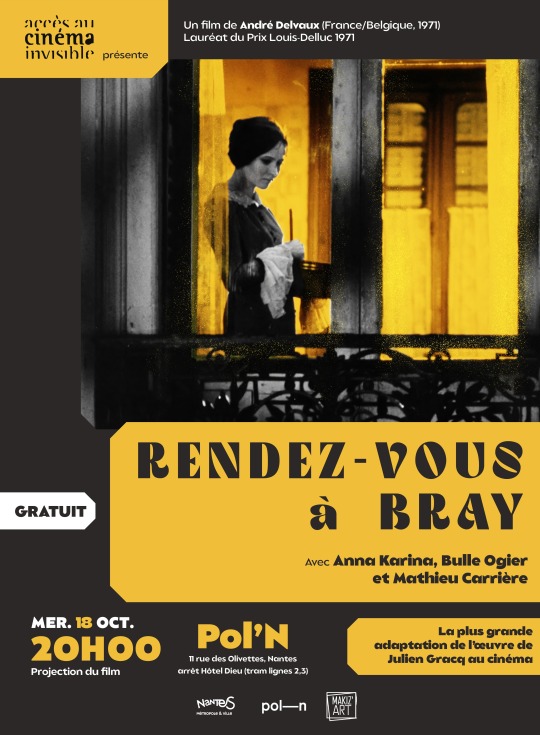
Accès au cinéma invisible vous donne rendez-vous, ce mercredi 18 octobre à 20h 11 rue des Olivettes (Nantes), pour découvrir la plus belle adaptation au cinéma de l'écrivain Julien Gracq, Rendez-vous à Bray, sorti au cinéma en 1971.
L’auteur florentais est réputé difficile à transcrire sur grand écran : grande densité narrative, paysages flous et sensibilité à fleur de peau.
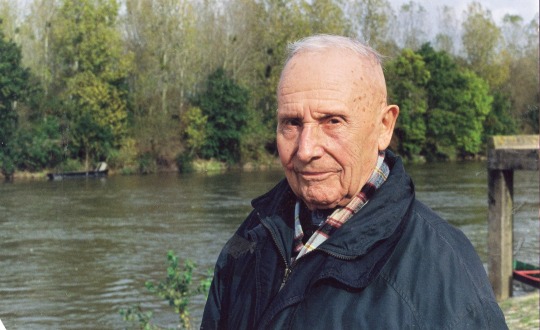
C’est André Delvaux, réalisateur belge adepte du surréalisme et développant un style de mise en scène qualifié de réalisme magique, qui va se lancer dans cette adaptation.
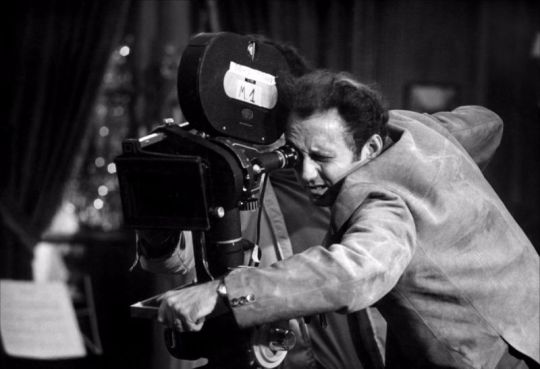
Delvaux est un féru de littérature, ayant à ce moment déjà adapté plusieurs fois au cinéma Johan Daisne (Un homme, un train avec Yves Montand en 1968), il continuera en 1983 avec Suzanne Lilar (Benvenuta avec Fanny Ardant) puis Marguerite Yourcenar en 1988 (L’Œuvre au noir avec Sami Frey).
En adaptant la courte nouvelle Le roi Cophueta tiré du recueil La presqu’île (Éditions Corti, 1970), Delvaux s'empare à la fois de l'univers restitué par Gracq, mais aussi de sa sensibilité. Il transpose son goût pour le cinéma à une œuvre pleinement littéraire. Avec le jeu d’Anna Karina et Matthieu Carrière, il réussit alors à transmettre aux spectatrices et spectateurs le mystère dont Gracq avait le secret.

En cela, Rendez-vous à Bray est autant un hommage au pouvoir de la littérature qu'à celui du cinéma. Le film fait la jonction entre ces deux pratiques pour devenir une œuvre à part entière encore trop méconnue en France, récompensée du prestigieux prix Louis-Delluc à sa sortie en 1971.
Projection gratuite à Pol-n, 11 rue des Olivettes (Nantes), à 20h le 18 octobre 2023.
#nantes#cinema#projection gratuite#acces au cinema invisible#julien gracq#andré delvaux#film#film oublié#invisible#vintage#littérature
2 notes
·
View notes
Text
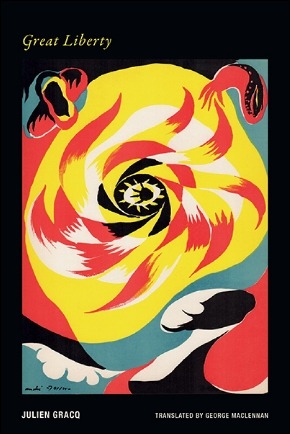
Out now: Great Liberty, a new translation of prose poems by Julien Gracq from Wakefield Press.
2 notes
·
View notes
Text
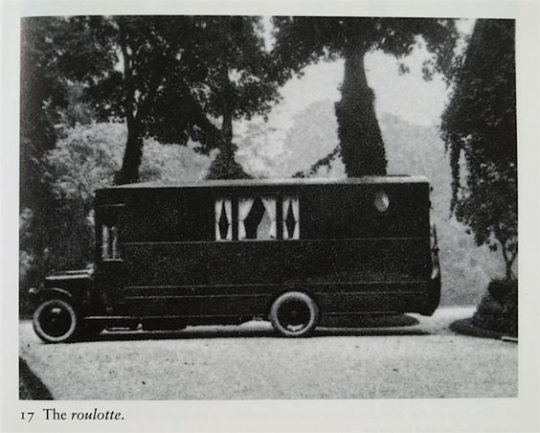
Raymond Roussel voyageait dans sa roulotte automobile « à cultiver sa mélancolie de poète reclus » . Se tenir à l’écart de la banalité impersonnelle du voyage en train et de ses arrêts prévisibles, voilà qui explique son souci de singularisation. Ce grand lecteur de Jules Verne, amateur de vulgarisation scientifique, dessinera lui-même les plans de cette « villa nomade » qui se déplace à quarante kilomètres heure. Elle lui permet de voyager au coeur de son intimité au monde, faisant de ce « yacht sur terre » selon l’expression d’un journaliste, la métaphore de son travail d’écrivain. Traduction du Nautilus ou encore « métaphore du bateau et de sa cabine, symbole de clôture et d’enfermement » , très vite la « maison roulotte » subit le destin de toute métaphore. Admirée , elle est poursuivie par le public, rompant avec l’intimité recherchée. Raymond Roussel l’abandonne sur une voie de garage.
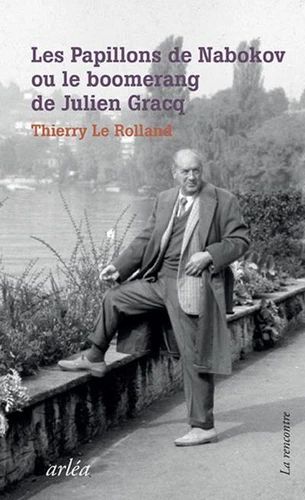
En marge de la création littéraire, dans les coulisses de l'écriture, ou en écho avec elle, nombre d'écrivains ont nourri des passions, des marottes, voire de drôles de manies. S'y attacher, c'est explorer la part d'intime et les pans d'existence sinon méconnus, du moins souvent cités et regardés "de loin". Thierry Le Rolland se penche avec tendresse sur ces singulières aventures humaines intensément vécues, et nous en révèle les bizarreries, les plaisirs et les audaces, les promesses tenues ou non, et l'étonnante part de mystère qui préside souvent à l'engagement d'une vie.
nonfiction.fr
#écrivains#passions#marottes#manies#bizarre#raymond roussel#vladimir nabokov#julien gracq#pierre loti#alfred jarry#paul eluard#valery larbaud
4 notes
·
View notes
Text
« There’s nothing that people rebel more against, I told Jacques, than being forced to acknowledge the secret and immediate power their fellow human beings have over them. . . A savage power, as indifferent as a thunderbolt, where intellect, merit, beauty, language are nothing but animal electricity, a polarity that suddenly develops. . . We never talk about it—it’s taboo. »
— Julien Gracq, A Dark Stranger
38 notes
·
View notes
Text
Il y a des chefs d’œuvres qui fertilisent leur matière, en font un carrefour magique, une étoile de toutes sans cesse foisonnante de nouveaux chemins
0 notes
Text
Books I have read in February 2023 & my opinion on them (ft. my lovely tulips)
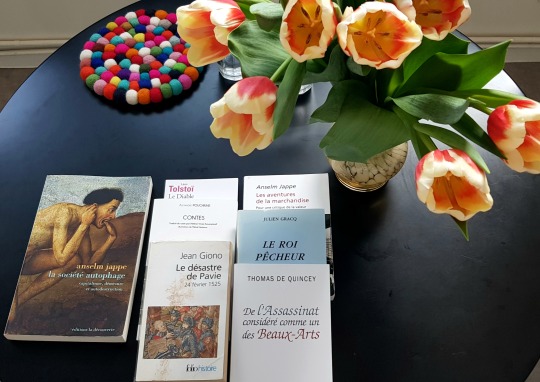
Le Diable, Léon Tolstoï, 1911 | Found it a bit boring. Didn’t like it as much as I thought I would.
Les aventures de la marchandise : pour une critique de la valeur (2003) & La Société autophage : capitalisme, démesure et autodestruction (2017), Anselm Jappe | A real, hard slap in the face. I think this will be a turning point in my political journey. Kinda want to do a in-depth review of the two books but I am not sure who would read it !
On Murder considered as One of the Fine Arts, Thomas de Quincey, 1827 | It was fun. I liked the first part the most, really captures the rambling inherent to academic lecturers. Much like the Confessions, de Quincey masters the art of beating around the bush. And I kinda like that.
Le Roi pêcheur, Julien Gracq, 1948 | Julien Gracq my beloved. Probably my favourite thing I read of him yet. It was sooooo good, such a great play.
Le Désastre de Pavie : 24 février 1525, Jean Giono, 1963 | I was skeptical about reading an historical essay written by a novelist but I was proven wrong! It was a really good book, well-written and the author offers a very interesting insight of the events. I now have really random knowledge of the year 1525.
Contes, Alexandre Pouchkine, 1831-35 | It was fun reading tales but I am a bit disappointed as they were originally written in verse and the translation is in prose!
#what happened to the quality of the picture lmaooo#do reads#book#books#bookblr#book review#book rec#book recommendations#bookworm#reading#reading journal#reading suggestions#tolsoi#anselm jappe#thomas de quincey#julien gracq#jean giono#Alexander Pushkin
12 notes
·
View notes
